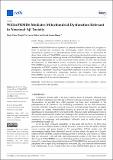Files in this item
Willin/FRMD6 mediates mitochondrial dysfunction relevant to neuronal Aβ toxicity
Item metadata
| dc.contributor.author | Chen, Doris | |
| dc.contributor.author | Yu, Wanjia | |
| dc.contributor.author | Aitken, Laura | |
| dc.contributor.author | Gunn-Moore, Frank J | |
| dc.date.accessioned | 2022-10-06T13:30:12Z | |
| dc.date.available | 2022-10-06T13:30:12Z | |
| dc.date.issued | 2022-10-06 | |
| dc.identifier | 281525746 | |
| dc.identifier | 88f1244b-4de9-489e-bde1-3cbcdaa0ec56 | |
| dc.identifier | 000866760900001 | |
| dc.identifier | 85139789644 | |
| dc.identifier.citation | Chen , D , Yu , W , Aitken , L & Gunn-Moore , F J 2022 , ' Willin/FRMD6 mediates mitochondrial dysfunction relevant to neuronal Aβ toxicity ' , Cells , vol. 11 , no. 19 , 3140 . https://doi.org/10.3390/cells11193140 | en |
| dc.identifier.issn | 2073-4409 | |
| dc.identifier.other | ORCID: /0000-0003-3422-3387/work/120432897 | |
| dc.identifier.other | ORCID: /0000-0001-7259-4491/work/120432919 | |
| dc.identifier.uri | https://hdl.handle.net/10023/26147 | |
| dc.description | This study was supported by the EPSRC (EP/P030017), Alzheimer’s Research UK, the Rosetrees Trust, and the China Scholarship Council. | en |
| dc.description.abstract | Willin/FRMD6 has been reported as a potential Alzheimer’s disease risk gene in a series of genome-wide association and neuroimaging studies; however, the mechanisms underlying its potential role in AD pathogenesis remain unknown. Here, we demonstrate the direct effects of Aβ on Willin/FRMD6 expression and position mitochondrial oxidative stress as a novel potential mechanism underlying the role of Willin/FRMD6 in AD pathogenesis. Specifically, using mouse hippocampal HT-22 cells and primary mouse neurons, we show that Aβ induces downregulation of the Willin/FRMD6 protein. Furthermore, we demonstrate that Willin/FRMD6 knockdown leads to mitochondrial dysfunction and fragmentation, as well as upregulation of ERK1/2 signaling, both of which are reported to be key early features of AD pathogenesis. Importantly, increasing Willin/FRMD6 expression was able to rescue Aβ-induced abnormalities in mitochondrial morphology, function, and energetics. Thus, enhancing Willin/FRMD6 expression holds potential as a therapeutic strategy for protecting against Aβ-induced mitochondrial and neuronal dysfunction. | |
| dc.format.extent | 27 | |
| dc.format.extent | 2593019 | |
| dc.language.iso | eng | |
| dc.relation.ispartof | Cells | en |
| dc.subject | Willin/FRMD6 | en |
| dc.subject | Mitochondiral dysfunction | en |
| dc.subject | Oxidative stress | en |
| dc.subject | Alzheimer's disease | en |
| dc.subject | Neurodegeneration | en |
| dc.subject | ERK signaling | en |
| dc.subject | QH301 Biology | en |
| dc.subject | QH426 Genetics | en |
| dc.subject | RC0321 Neuroscience. Biological psychiatry. Neuropsychiatry | en |
| dc.subject | NDAS | en |
| dc.subject.lcc | QH301 | en |
| dc.subject.lcc | QH426 | en |
| dc.subject.lcc | RC0321 | en |
| dc.title | Willin/FRMD6 mediates mitochondrial dysfunction relevant to neuronal Aβ toxicity | en |
| dc.type | Journal article | en |
| dc.contributor.sponsor | EPSRC | en |
| dc.contributor.institution | University of St Andrews. School of Biology | en |
| dc.contributor.institution | University of St Andrews. Biomedical Sciences Research Complex | en |
| dc.contributor.institution | University of St Andrews. Sir James Mackenzie Institute for Early Diagnosis | en |
| dc.contributor.institution | University of St Andrews. Centre for Biophotonics | en |
| dc.contributor.institution | University of St Andrews. Institute of Behavioural and Neural Sciences | en |
| dc.identifier.doi | 10.3390/cells11193140 | |
| dc.description.status | Peer reviewed | en |
| dc.identifier.url | https://www.mdpi.com/2073-4409/11/19/3140 | en |
| dc.identifier.grantnumber | EP/P030017/1 | en |
This item appears in the following Collection(s)
Items in the St Andrews Research Repository are protected by copyright, with all rights reserved, unless otherwise indicated.

